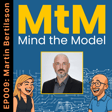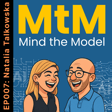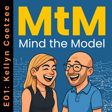
Mind the Model: Episode 002: Kate Russell
Register for tickets to see Mind the Model live at SXSW at Clear Hayes House on Thursday 16 Oct from 12:30-1:30pm. Get tickets at www.clearhayes.com/clearhayeshouse
Get in touch with us at mindthemodelpod@gmail.com - we’re always interested to hear your thoughts, recommendations for guests or complaints about Nathan’s microphone
OUR GUEST:
https://www.linkedin.com/in/katealexandrarussell/
Kate Russell is a dynamic leader with over 18 years of experience across Brand Marketing, Communications, Community, Wholesale and People. She has worked with global and Australian brands including lululemon, Manning Cartell and the Australian Fashion Council, as well as Marketing/ PR agencies such as n2n (now Publicis) and Example, bringing a unique blend of strategic marketing and cultural leadership to the table. With deep roots in brand and community-building, Kate is known for creating inclusive, high-performing teams and communities, grounded in connection and purpose.
Today, she is the founder of Hum[ai]n, a consultancy that helps businesses navigate the people and culture impacts of an AI-driven workforce. Kate partners with organisations to ensure technology enhances, not replaces, human potential, guiding leaders through the mindset and culture shifts essential for successful transformation. A trusted C-suite advisor and speaker at events including Vivid Ideas and Australian Grand Prix with Porsche Australia, Kate is also a long-time mentor with Marketing Women Inc. and passionate advocate for creating cultures that empower people and purpose-led, people-first change.
To find out more visit Kate’s website - https://hum-ai-n.replit.app/ and check out Kate’s AI Readiness Playbook at https://hum-ai-n.replit.app/ai-readiness-playbook
REFERENCES:
Klarna: https://gizmodo.com/klarna-hiring-back-human-help-after-going-all-in-on-ai-2000600767
Bee AI Wareable: https://techcrunch.com/2025/07/22/amazon-acquires-bee-the-ai-wearable-that-records-everything-you-say/







